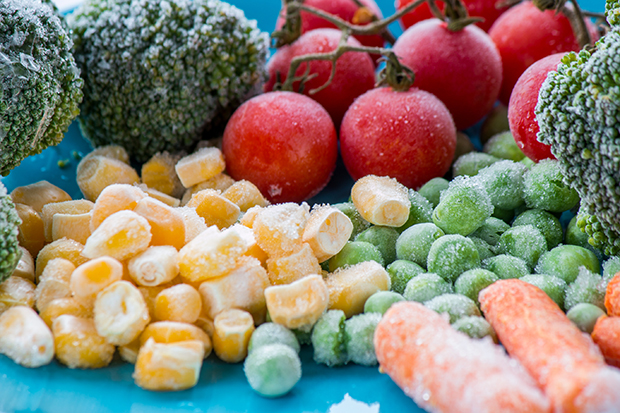
At the end of every summer season, do you find yourself mourning the loss of your favorite fresh fruits and veggies? It might be time to hit the freezer aisle because when it comes to frozen versus fresh vegetables, both are winners.
Hidden between the frozen pizza, sugary breakfast foods, and other ultra-processed foods, frozen veggies (and fruits!) are actually a terrific way to enjoy produce when it is no longer in season. In fact, they may actually be better for you in some instances.
One study examined the vitamin content of eight different fresh and frozen vegetables and fruits: blueberries, broccoli, carrots, corn, green beans, peas, spinach, and strawberries. Overall, there was no difference between frozen and fresh items. At times, the frozen even had more nutrients.
Another study found that folate levels, or B vitamins, in frozen versus fresh vegetables had negligible differences, even after several months in the freezer.
Another bonus of eating frozen vegetables and fruits is that fresh produce often spend days or even weeks in transit from a farm to a store to your refrigerator, where they’ll sometimes sit for a few days before being consumed. Because of this, produce is often picked before it’s fully ripened, cutting short the time these vegetables and fruits need to fully mature and develop all the nutritional goodies they have to offer.
Frozen vegetables and fruits, on the other hand, are usually picked at the height of their ripeness, when they’re bursting with vitamins and minerals. They’re then snap-frozen, locking in nutrients at their finest hour.
Buying frozen versus fresh vegetables and fruits also means you can use foods that you might not be able to purchase fresh year-round. You can also often get them on sale, making it easier to keep good-for-you foods on hand — even on a budget. If you’re struggling to get your daily intake of greens and fruits, eating frozen is definitely better than eating none at all (Plus, using frozen is a cinch when it comes to green smoothies).
Frozen food tips
Of course, there are a few tips and tricks to getting the most out of your frozen vegetables and fruits:
Look for high-quality foods. When possible, buy organic frozen veggies and fruits. Those marked “U.S. Fancy” are the highest quality veggies available, but you also want organic. To avoid the most pesticide-laden foods, be sure to always buy organic versions of the dirty dozen fruits and veggies.
Don’t freeze it forever. While frozen veggies are just as healthy as fresh, like with any food, the nutritional value will degrade over time. In general, eat frozen produce within three months of purchase to ensure it retains all the nutrients you want.
Look for one ingredient. These days, you can buy frozen veggies that come with all sorts of sauces, dressings, sugars, but opt for the “naked” version of the vegetables and fruits instead; there should be just one ingredient on the label. You can always add your own later.
Don’t lose the nutritional value while cooking. The best way to cook frozen vegetables is by steaming or stir-frying. Not only does boiling strip away lots of the nutrients, but you’re likely to end up with limp, overcooked veggies — and no one wants that.
Sneak it into other meals. The beauty of having frozen vegetables and fruits on hand is that you never have to run out. Use frozen berries or spinach in your favorite healthy smoothie recipes, top your favorite dip with vegetables, or add some frozen fruit to yogurt.
Skip canned versions. While frozen is just as good as fresh, I’d avoid canned veggies and fruits, with the exception of pumpkins and tomatoes. Not only do these products lose nutrients during the canning process, but they’re usually packed in sugary syrups and juices meant to strengthen their flavor.
Josh Axe, DNM, DC, CNS is a certified doctor of natural medicine, doctor of chiropractic, and clinical nutritionist with a passion to help people get healthy by using food as medicine. For more information, please visit www.draxe.com.

